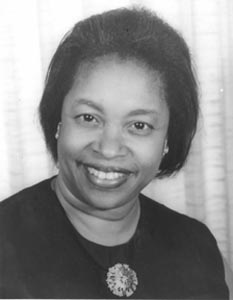 This Goodly Land
This Goodly Land
Margaret Walker (July 7, 1915–November 30, 1998)

Other Names Used
- Margaret Abigail Walker: birth name
- Margaret Walker Alexander: married name, used academically
Alabama Connections
- Birmingham, Jefferson County: birthplace, childhood residence
- Greenville, Butler County: home of maternal relatives, setting for a portion of Jubilee
Selected Works
- Walker, Margaret. For My People. New Haven: Yale University Press, 1942.
- Walker, Margaret. Jubilee. Boston: Houghton Mifflin, 1966. Rpt. Boston: Houghton Mifflin, 1999.
- Walker, Margaret. Prophets for a New Day. Detroit: Broadside Press, 1970.
- Walker, Margaret. October Journey. Detroit: Broadside Press, 1973.
- Walker, Margaret. Richard Wright, Daemonic Genius: A Portrait of the Man, a Critical Look at His Work. New York: Warner Books, 1988.
- Walker, Margaret. This Is My Century: New and Collected Poems. Athens: University of Georgia Press, 1989.
- Walker, Margaret. How I Wrote Jubilee and Other Essays on Life and Literature. Ed. Maryemma Graham. New York: Feminist Press at The City University of New York, 1990.
Literary Awards
- Yale Series of Younger Poets Award, Yale University Press, 1942, for For My People
- Houghton Mifflin Literary Fellowship Award, 1966, for Jubilee
- American Book Award, Lifetime Achievement, Before Columbus Foundation, 1993
- Richard Wright Literary Excellence Award, Natchez Literary and Cinema Celebration and Natchez Newspapers, Inc., 1995
Biographical Information
Margaret Walker was born and spent much of her early life in Birmingham, Ala. When she was ten, the family moved to New Orleans where both her parents had teaching jobs. Her grandmother lived with the family and entertained the children with family stories of life under slavery. Walker’s parents introduced her to poetry and the classics, and she began writing poetry and prose at age eleven. Walker graduated from Gilbert Academy at age fourteen and began attending college at New Orleans University (now Dillard University). After two years, she transferred to Northwestern University and graduated with an AB in English in 1935. Walker was then hired by the Works Progress Administration (WPA) Federal Writers Project in Chicago. She became friends with Richard Wright, and the two helped each other with their writing projects. During this period, some of her poems were published in The Crisis and in Poetry magazine. In 1939, Walker enrolled in graduate school at the University of Iowa, earning an MA in 1940. Her thesis was a collection of poems later published as For My People.
Walker taught for several years at Livingstone College in North Carolina and at West Virginia State College, Institute (now West Virginia State University). In 1949, she began teaching at Jackson State College (now Jackson State University) in Mississippi. In 1962, Walker took time off to pursue a PhD at the University of Iowa. Her dissertation was a draft of Jubilee, a novel based on her grandmother’s stories. After its publication in 1966, Walker returned to Jackson State where in 1968 she established the Institute for the Study of the History, Life, and Culture of Black People (renamed in 1989 the Margaret Walker Alexander National Research Center). In the last three decades of her life, Walker published three books of poetry, two collections of essays, and a controversial biography of Richard Wright. While she was working on Jubilee, Walker received Rosenwald and Ford Fellowships to do research. Later in her career, she held National Endowment for the Humanities and National Endowment for the Arts senior fellowships and a Yaddo residency.
Interests and Themes
Margaret Walker's work focuses on the lives of black Americans and is strongly influenced by black folklore and stories from the Bible. Walker's novel Jubilee is a Civil War story told from a black perspective; her poems feature portraits of black poets, leaders, and community figures; and her nonfiction examines black authors and describes her experiences as a twentieth-century American black woman.
For More Information
Please check your local library for these materials. If items are not available locally, your librarian can help you borrow them through the InterLibrary Loan program. Your librarian can also help you find other information about this author.
There may be more information available through the databases in the Alabama Virtual Library. If you are an Alabama citizen, AVL can be used at your public library or school library media center. You can also get a username and password from your librarian to use AVL at home.
Reference Books
- Carmichael, Jacqueline Miller. Trumpeting a Fiery Sound: History and Folklore in Margaret Walker's Jubilee. Athens: University of Georgia Press, 1998.
- Graham, Maryemma, ed. Fields Watered With Blood: Critical Essays on Margaret Walker. Athens: University of Georgia Press, 2001.
- Walker, Margaret. Conversations with Margaret Walker. Ed. Maryemma Graham. Jackson: University Press of Mississippi, 2002.
Reference Book Chapters and Encyclopedia Entries
- Caton, Bill. "Margaret Walker Alexander: Making the Time"; Fighting Words: Words on Writing from 21 of the Heart of Dixie's Best Contemporary Authors. Montgomery: Black Belt Press, . 124-135.
Reference Web Sites
- "Margaret Walker". Bhamwiki. 2007. http://www.bhamwiki.com/wiki/index.php?title=Margaret_Walker.
- Allegro, Donna M. "Margaret Walker [1915-1998]". Modern American Poets. 2002. University of Illinois at Urbanna-Champaign. http://www.english.uiuc.edu/maps/poets/s_z/walker/walker.htm.
- George, Courtney. "Margaret Walker". The Encyclopedia of Alabama. 2009. Alabama Humanities Foundation and Auburn University. http://www.encyclopediaofalabama.org/face/Article.jsp?id=h-2430.
- Tucker, Jon. "Margaret Walker Alexander". Mississippi Writers Page. 2004. Department of English, University of Mississippi. http://www.olemiss.edu/mwp/dir/alexander_margaret_walker/index.html.
- Wolfe, Melissa E. "Margaret Walker Alexander". Mississippi Writers & Musicians. 2007. Starkville High School. http://www.mswritersandmusicians.com/writers/margaret-walker.html.
Location of Papers
- Margaret Walker Alexander National Research Center, Jackson State University
Photo courtesy of the Margaret Walker Alexander National Research Center, Archives and Records Division, Margaret Walker Alexander Personal Papers, Jackson State University, Jackson, Miss.
Last updated on Oct 13, 2009.